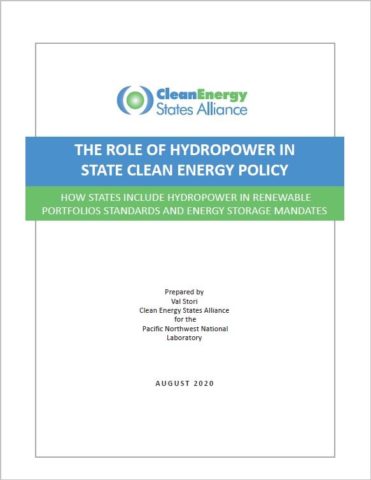The Role of Hydropower in State Clean Energy Policy
Val Stori | Clean Energy States Alliance
This report analyzes state policies across the US to review eligibility criteria and the role hydropower is currently playing in helping states meet their emissions reduction and clean energy goals. It finds that while hydropower, in some form, is an eligible resource in all state renewable portfolio standards (RPS), it is also limited in many ways. Pumped hydropower energy storage also is largely excluded from state renewable energy policies, including energy storage mandates and targets.
A detailed case study of New England’s RPS markets, based on data provided by Sustainable Energy Advantage, reveals that hydropower facilities are generally only eligible for the less remunerative classes of the RPSs. Some hydropower facilities can participate in more valuable New/Growth classes alongside other qualifying renewables, but must meet environmental criteria.
Hydropower, as an abundant, clean, and renewable energy resource, can help states not only meet their increasing renewable energy targets, but also help to integrate higher levels of intermittent renewables into the grid. However, hydropower faces a number of challenges in its inclusion in state renewable energy policies, including RPS restrictions based on system size and in-service date and new resource solicitation periods and contract terms that are too short to accommodate new pumped storage hydropower. Performance incentives, loan guarantees, and streamlined permitting can help level the playing field.
The report is broken into three sections:
- Hydropower in State Renewable Portfolio Standards: This section highlights how hydropower qualifies for and participates in state RPS programs and identifies key takeaways and high-level strategies for maximizing hydropower’s benefits.
- Hydropower’s Participation and Opportunities in New England RPS Markets: This section takes a close look at hydropower in New England’s RPS markets and how each state’s RPS eligibility criteria affect hydropower’s participation. This section was written with support from Sustainable Energy Advantage, LLC.
- Pumped Hydropower in State RPS Mandates and Energy Storage Policies: This section explores pumped hydropower energy storage (PHES) and discusses why state policies and programs often overlook the technology. It highlights PHES eligibility in RPS programs and energy storage mandates and targets, offering policy and regulatory approaches that open opportunities for PHES participation.
For each section, the report offers high-level takeaways and strategies for policy and regulatory changes that can reduce barriers to hydropower development and can capture hydropower’s range of benefits, including carbon-free electricity and renewable integration.

